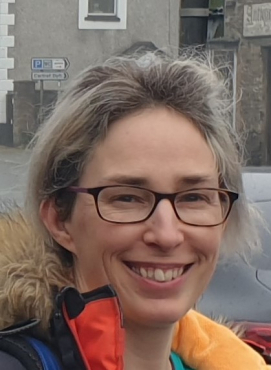Dr Anne Jay
Ph.D, M.Sci, FGS, FGS (India)
Professional biography
Dr Anne Jay, I am currently a Senior lecturer in the School of Environment, Earth and Ecosystem Sciences.
2023- Module Team chair S229 Earth Science (prodcution) replacement for S209.
2021-2023 Deputy module team chair S209 Earth Science, 60 pt level 2 module.
2017-2023 Block lead on S112 Science concepts and practice, and S209 Earth science
2017-2020 Block lead on S201 Science and Society
2016-2017 Lead author with Dr Marcus Badger on the FutureLearn MOOC, The Earth in my pocket: an introduction to geology. https://www.futurelearn.com/courses/geology This is now available on OpenLearn.
2014- 2017 Daphne Jackson Research Fellow, School of Environment, Earth and Ecosystem Sciences, Open University, UK.
2008-2011, Teaching Associate, Department of Earth Science and Engineering, Imperial College, London, UK.
2006-2007, Post-Doc, Palaeomagnetic Group, Institut de physique du globe de Paris, France.
2001-2005 Ph.D Volcano Dynamics Group, Dept. of Earth Sciences, Open University, UK.
A copy of my thesis is available under Publications. If you would like a copy of the original PDF, where the figures are clearer, please e mail me.
1997-2001 M.Sci Geological Sciences, University College London, UK
Research interests
My Google Scholar link A.E. Jay - Google Scholar
PhD students
Current:
Tanvi Chopra (2023-2026) PhD entitled: Rapid Emplacement of the Lower Deccan Traps and its Implications for Late Cretaceous Environmental Change.
Previous:
Dr Nikola Rogik (2016-2020), PhD entitled: Radiant and mass fluxes in multi-platform, multi-payload satellite-based volcano monitoring (Nikola Rogic - Google Scholar)
Physical Volcanology and lava architectire of large igneous provinces (LIPs). With specific research in the Deccan Traps, India and the Karoo in South Africa and Lesotho.
I am using ArcGIS to investiage the structure of the Deccan LIP.
I am also interested in the role large igneous provinces play in mass extinction events.
But to be honest I love all of the Earth Sciences, but especially the bits involving field work.
Using very high resolution 3d models to teach geology
Teaching interests
Current lecturer on:
S229 Earth Science (in production)
Previous Modules
S209: Earth Science
S112 Science concepts and practice
S201: Science and society
S808: Earth Science a systems approach
Lead scientist on a FutureLearn MOOC called The Earth in my pocket: an introduction to geology. https://www.futurelearn.com/courses/geology which first presented in February/march 2017. Next presentation 1st April 2019 and 11th November 2019.
My previous position at Imperial College, London was a 100% teaching role. I taught optical mineralogy, surface processes, mapping and field work, earth science synthesis, and geosciences techniques. Other roles include co-ordinating 1st and 2nd year tutorials and 3rd year mapping projects, a 1st year tutor, checking risk assessment forms, and mentoring PhD students.
Impact and engagement
I enjoy outreach and explaining what I and other scientists do all day!
My first foray into main stream media is a podcast part of the BBC's "Boring Talk" series on my favorite rock basalt. This short monologue explain why, in spite of appearing very boring, and being consided boring by most geologist, basalt is, in fact very interesting. Click on the web link above to listen to the podcast.
I mainly go to primary schools and give talks and demonstrations to the children on volcanoes. I love the feedback, the children ask wonderful questions "is it true your bones burn in lava?" and other such gems.
Whilst working at Imperial College I used to go to schools and university fairs to talk to A level students about Geoscience degrees, university life and choosing the right place to study. It was very rewarding being able to help them work out what they want to do next in life.
I have also been involved in 2 summer science exhibitions at the Royal Society, which were brilliant fun.
I have taken a number of media training days. Here I am doing a piece to camera with the brilliant Science Faculty media training team.

International links
Working and visiting international colleagues is a great part of the job.
I am currently working with Prof. Steve Self, an Adjunct Professor at University of California at Berkeley.
I am working with Dr Loyc Vanderkluysen, from Drexel University, on the Deccan Traps.
I have been lucky enough to work with Prof. Vincent Courtillot and his group at IPGP in Paris. Studying the Karoo Large Igneous Province in Southern Africa, where we worked with Prof. Goonie Marsh from Rhodes University.
I have visited The Planetary Science Institute in Tucson, Arizona where I gave a seminar on my PhD work.
